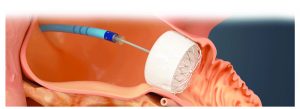 Are you on blood thinners for AFib? Are you finding that after long-term use, you’re bleeding and bruising more often? If so, you should speak to your cardiologist about your bleeding issues, as these can be life-threatening and even cause bleeding in the brain, which can lead to imminent death. Individuals with AFib have a 5X greater risk of stroke than those individuals not suffering from AFib.
Are you on blood thinners for AFib? Are you finding that after long-term use, you’re bleeding and bruising more often? If so, you should speak to your cardiologist about your bleeding issues, as these can be life-threatening and even cause bleeding in the brain, which can lead to imminent death. Individuals with AFib have a 5X greater risk of stroke than those individuals not suffering from AFib.
If you have AFib not caused by a heart valve issue, you may be eligible for an innovative procedure that will prevent strokes and get you off of blood thinners permanently. The WATCHMEN procedure has proven to be a highly effective procedure.
AFib
Because of the restriction and erratic heartbeat in patients with non-valvular AFib, their blood commonly pools into the left atrial appendage (LAA). The pooling of the blood causes clots to form in the LAA, which is extremely dangerous. The clots can break away and travel through the bloodstream directly toward the brain and cause a blockage. When a clot blocks the blood flow to the brain, a stroke will follow due to the cut off of oxygen and blood. That is why individuals with AFib must be on blood thinners. However, the WATCHMAN procedure can save lives by preventing the clots from forming, and the one-time treatment gets people off of blood thinners permanently.
How does it work?
It works similarly to a vascular stent, but instead of opening a valve, it closes and occludes the LAA, so that no blood clots can form. It’s a tiny device that’s guided to the heart through a small incision in the upper thigh area. The patients are under general anesthesia during the treatment, and the entire procedure usually takes less than an hour.
After the procedure, patients will be required to stay on blood thinners for approximately 45 days. This gives the small implanted device time to occlude the LAA area completely as heart muscle and tissue grow over it.
Symptoms:
• Chest tightness or pain
• Dizziness
• Extremely fatigued and lethargic
• Fluttering heart sensation
• Heart palpitations
• Light-headedness
• Shortness of breath
Causes:
• High blood pressure
• Hyperthyroidism
• Congestive Heart Failure
• Lung problems
• Sleep apnea
• Stimulants (alcohol, caffeine, or tobacco)
• Extreme Stress
If you are concerned about AFib or other heart-health issues, please see an experienced cardiolo-gist immediately
Dr. Joseph Freedman MD, MBA
Dr. Freedman brings many years of experience as a cutting edge cardiologist specializing in the prevention, diagnosis, and treatment of all cardiac disease. He trained at the prestigious Cleveland Clinic, continually ranked #1 in Cardiovascular Care, where he focused on cardiac imaging. He achieved five board certifications in Internal Medicine, Cardiology, Comprehensive Adult ECHO, Nuclear Cardiology and Cardiac CT. During his tenure as the lead noninvasive cardiologist at Florida Medical Center in Ft. Lauderdale, he helped lead the hospital to achieve Level 5 chest pain certification, the highest designation of cardiac excellence.
He has spoken on national health care radio programs and has appeared on local news, highlighting the latest in cardiovascular care. Dr. Freedman prides himself on being an advocate for the patient. Every patient is unique, and he works carefully with leading local and national experts to make sure patients receive the best specialty procedural care possible for that particular case. Dr. Freedman has done research in cardiac MRI studies of the heart, in nuclear scanning, and has participated in the research trials of several leading cholesterol-lowering drugs. Dr. Freedman also has extensive experience in pulmonary hypertension and ran a large clinic in Broward County for these specific and often undiagnosed patients. Dr. Freedman speaks Spanish as well.
Cardiac Care Group, LLC
3208 Chiquita Blvd S., Suite 110
Cape Coral, FL 33914
(239) 574-8463
www.flccg.com
This information is for educational purposes only and is not intended to replace the advice of your doctor or health care provider. We encourage you to discuss with your doctor any questions or concerns you may have.










